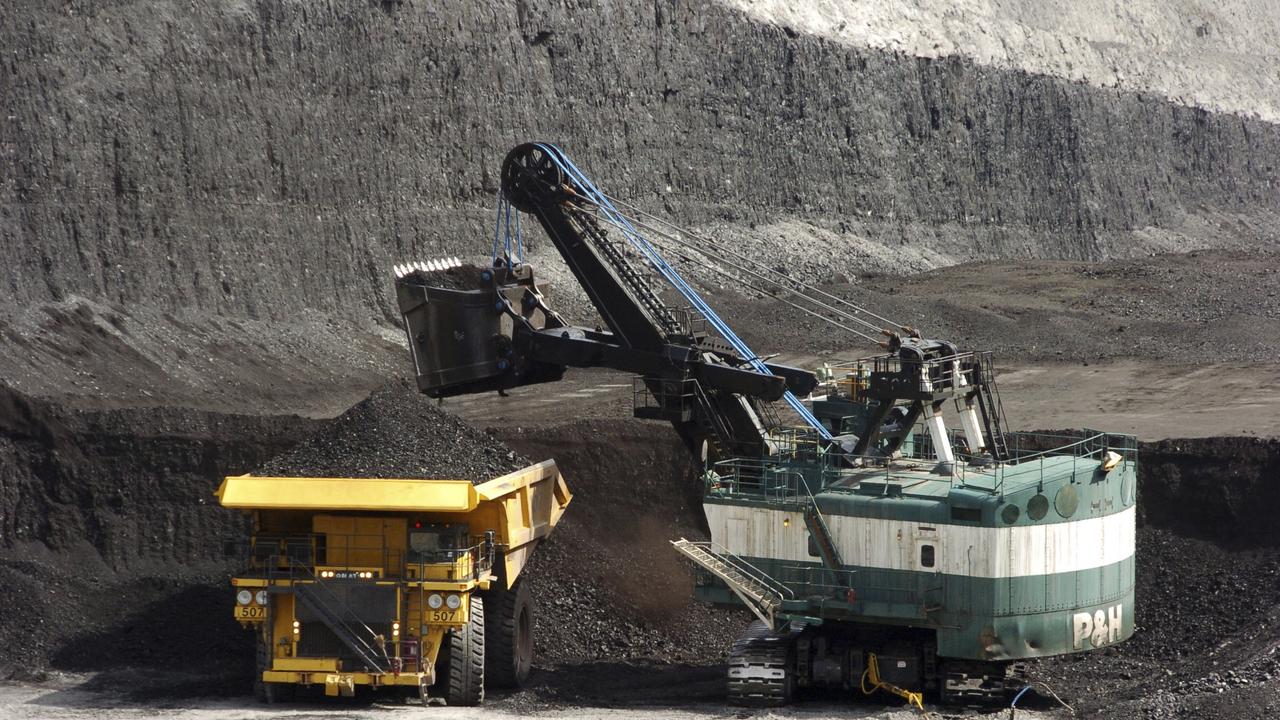BusinessNow: Live stock market news; Wesfarmers, Coles results plus analysis and opinion
Macquarie says the airline’s cash generation is “under appreciated”, the stock well placed to play sector catch up.
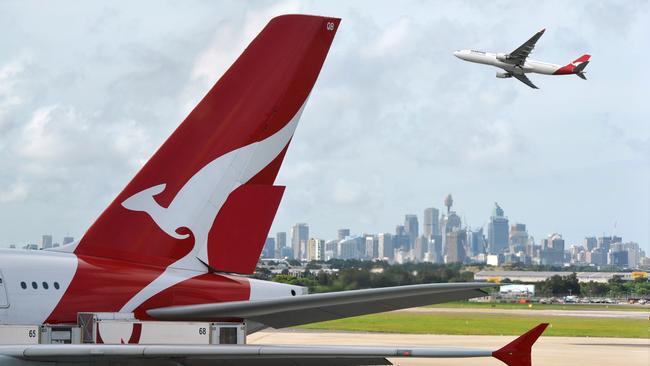
BusinessNow top stories: Santos resumes trade on Canberra gas intervention plans; Wesfarmers, Coles supermarkets results; Citi give BHP Billiton report an A+
Daniel Palmer 5.00pm: Stocks lift despite gas slump
Australian stocks enjoyed a fifth straight day of gains on Thursday despite a drag from the energy space as a possible gas reserve policy stunned traders.
The slack was more than picked up by the big banks and national carrier Qantas, which struck a 12-month high on a positive analyst note from Macquarie.
At the close, the benchmark S&P/ASX 200 index climbed 9.5 points, or 0.16 per cent, to 5,921.5, while the broader All Ordinaries index edged up 7.6 points, or 0.13 per cent, to 5,944.4.
The local market had received a mixed lead from offshore as enthusiasm waned through the latest Wall Street session.
“Having bought the rumour, US investors sold after the unveiling of President Trump’s tax plan,” CMC Markets chief market strategist Michael McCarthy said.
“Although the initial response was positive, and US indices traded in the green for most of the session, the looming market close sparked a minor panic.”
Greg McKenna, chief market strategist at CFD and FX provider AxiTrader, said traders would still likely take the news as a positive in the coming weeks.
“What the plan does is outline and reaffirm that Trump, his administration, and his finance and economic team are still moving forward on their plans,” he said.
“These plans are the ones that were a big part of buoying investor sentiment toward US stocks.”
Commodity prices were largely down modestly on a strengthening US dollar overnight, weighing on the resources sector as a whole.
3.50pm: Lost Property: the haves and have-nots
Janet Hogan calls it a form of “moral superiority” — the way some millennials tend to look down their noses at the idea of saving for a house.
“They look at us Baby Boomers, who worked every weekend renovating, and think, ‘I’m not doing that.’ They’re experiencing things and travelling the world. We (boomers) lived by the saying, ‘My home is my castle.’ For them, home is whatever country they are in at the time. They are gypsies. There is this cool thing about not having a bricks-and-mortar base.”
Of course, her claim would be fiercely argued by the 89 per cent of Australian non-homeowners who say they believe it is important to buy their own house, according to a CoreLogic survey released last month.
Read more here or watch below:
3.16pm: Broker ratings update
Qantas (QAN) raised to Buy vs. Neutral — BAML
Aumina (AWC) raised to Neutral vs. Sell — Citi
Independence Group (IGO) raised to Buy vs. Neutral — Citi
See more broker ratings changes here
3.15pm: LISTEN: The Money Cafe
When every five dollars added to the iron ore spot price translates roughly to an extra billion dollars in Australia’s budget, the future trajectory of the resource becomes vital.
So where to next?
Don’t ask Treasury, they just work with assumptions, not projections.
In this week’s episode of The Money Cafe, James Kirby and Alan Kohler discuss Canberra’s budget arithmetical, the elementary mistake in CPI calculations and Amazon’s march into Australia.
Listen below or click here to subscribe on iTunes.
2.43pm: RBC stays upbeat on Santos, Origin
The Federal Government’s new gas policy is “uniformly negative” for sovereign risk, according to RBC.
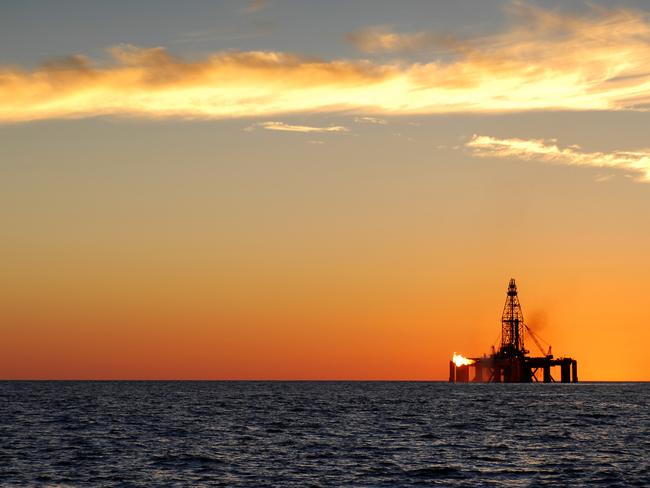
“The Government’s press release references jobs being put at risk due to unavailability of
‘competitively’ priced gas,” the broker says.
“We see no mention of the jobs created during the five-year construction period and more than $50bn investment in the three Gladstone projects.
We concur with many in the industry who place the majority of the blame for increasing gas prices on certain state sanctioned fracking moratoriums and excessive red and green tape involved in approving projects.
Regardless of the rights or wrongs of this situation, our investment recommendations reflect a bias towards those who have ample gas to vend into the domestic market.
Hence we retain our ‘Outperform’ recommendation on Origin (ORG) and our ‘Sector Perform’ recommendation on Santos (STO).”
2.33pm: BoJ keeps monetary policy unchanged
Japan’s central bank on Thursday trimmed its annual inflation forecast in an acknowledgment of the struggles it faces in jacking up consumer prices.
“Today’s downward forecast adjustment highlights that the Bank is still struggling to lift inflation,” research house Capital Economics said in a commentary.
Still, the bank kept monetary policy unchanged as it issued a relatively upbeat view on the world’s number three economy, slightly upgrading its annual GDP outlook, after a meeting.
It said the economy was “likely to continue expanding and maintain growth” above expectations.
The BoJ raised its economic growth forecast for the current fiscal year to 1.6 per cent from 1.5 per cent earlier.
The BoJ also left its massive 80 trillion yen ($719 billion) annual asset-purchase scheme unchanged and said it would press on with a plan to keep the yield on government 10-year bonds around zero.
Both measures are central to the BoJ’s efforts to hike consumer prices and stimulate the economy.
AFP
Daniel Palmer 2.20pm: Global market props up Future Fund
The Future Fund delivered gains in the March quarter exactly in line with its targeted growth rate as it benefited from a rise in global equity valuations.
For the three months to March 31, the value of the nation’s sovereign wealth fund lifted 1.6 per cent to just shy of $130 billion.
1.50pm: Qantas low-flying fruit: Macquarie
Macquarie has reiterated its ‘Outperform’ rating and $4.90 target price on Qantas (QAN), saying the airline’s cash generation is “underappreciated”.
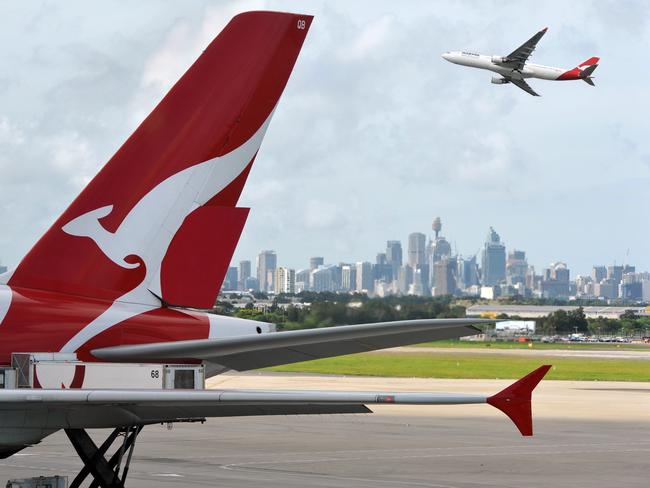
Using consensus expectations for operating cashflow and a base level of annual capex of $1.5b generates $500-$600m of surplus cash, which Macquarie expects to be returned via buyback, resulting in EPS accretion of 32 per cent by FY20.
Also, while Macquarie’s base case doesn’t assume any multiple expansion, if Qantas delivers a sustained earnings profile, return on invested capital exceeds its weighted average cost of capital, and the buybacks are delivered, it is “difficult to perceive Qantas not trading at a market-based multiple”, Macquarie says.
With Ryanair, easyJet and Norwegian Air Shuttle on PE’s of 14 and 16 times PE, US airlines trade on 11 times, a sub-peer PE ratio of 10 times for Qantas, would imply a price of $5.90 based on Macquarie’s FY18 basecase EPS.
1.25pm: Commodities spur trade surge
Australia’s terms of trade surged another 8.2 per cent in the March quarter on the back of stronger commodity prices.
Export prices rose 9.4 per cent in the March quarter, driven by growth in crude materials and mineral fuels, while import prices rose 1.2 per cent, according to the Australian Bureau of Statistics trade price indexes.
In the year to March, export prices were up 29.1 per cent and import prices down 0.6 per cent.
AAP
12.55pm: Trump holds on NAFTA termination
President Donald Trump has told the leaders of Mexico and Canada that he will not pull out of the North American Free Trade Agreement.
The White House made the surprise announcement in a readout of calls Wednesday between the world leaders.
The White House says the president “agreed not to terminate NAFTA at this time.” Instead, Mexican President Enrique Pena Nieto and Canadian Prime Minister Justin Trudeau “agreed to proceed swiftly, according to their required internal procedures, to enable the renegotiation” of the trade deal to “the benefit of all three countries.” Trump has blamed NAFTA for American job losses.
He says he believes “that the end result will make all three countries stronger and better.”
AP
Daniel Palmer 12.32pm: South32 boosts cash pile
BHP spin-off South32 (S32) has booked a strong increase in cashflow, despite struggling to match production forecasts of analysts through the March quarter.
The group was also forced to slash projected output from its giant Cannington mine after a recent underground fire.
For the three months to March 31, alumina output came in at 1.29 million tonnes as against market estimates for 1.33mt, according to Bloomberg-compiled numbers.
Andrew White 11.39am: Spotless backs reform to lift profit 25pc
Spotless Group (SPO) expects to lift profit by as much as 25 per cent in 2017-18 as it continues on a strategic reset built around winning longer and larger facilities and service contracts.
Formally rejecting a takeover bid from Downer EDI this morning Spotless said it expected to earn $85m-$100m in 2018 as a result of the strategic reset being led by chief executive Martin Sheppard.
At the top end of the range that is 20.5 per cent higher than the average of analysts forecasts of $83m. It also represents a gain of up to 20 per cent from the bottom of the range of 2017 earnings guidance of $80m-$90m that was reaffirmed in a target statement released this morning. The range also indicates that 2018 profit fall if it comes in at the $85m bottom of the 2018 guidance versus the top of the 2017 year result.
More to come.
11.33pm: House price risk for banks
CoreLogic’s April house price data may be a risk for banks on Monday.
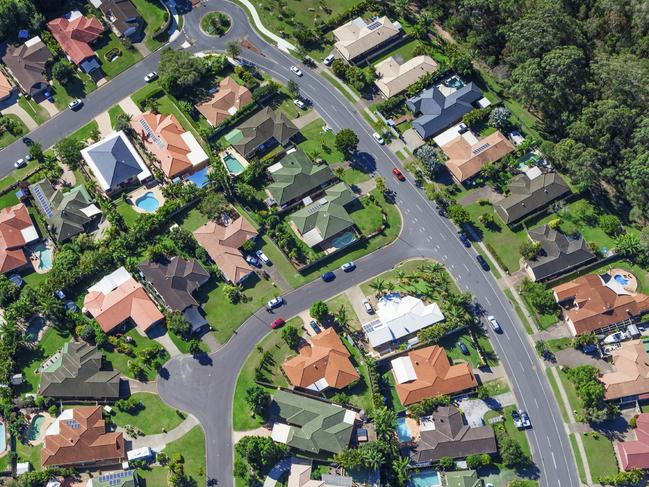
“Speculation that the housing market is moving through its peak phase of growth is likely to be supported by CoreLogic when April housing market results are published on Monday,” says the firm’s head of Asia Pacific research, Tim Lawless.
“The CoreLogic hedonic home value index has virtually held steady over the first twenty-seven days of the month for the five city aggregate index, with a subtle fall in Sydney values over the month to date.”
Mr Lawless notes that the softer results are due to follow a strong re-acceleration in home values that has been evident through the second half of 2016 and the first quarter of 2017.
And recent regulatory changes aimed at slowing the pace of investment and interest-only lending have pushed mortgage rates slightly higher and slowed the pace of investment demand.
“These changes appear to be having a dampening effect on housing market conditions,” he says.
11.03am: Hot air cools local trade
Australia’s S&P/ASX 200 is being restrained by selling related to Australia’s new gas export policy.
Energy is leading falls in a majority of market sectors, with Santos, Origin and AGL Energy coming under pressure.
Santos is worst affected with a 7.4 per cent tumble since it exports more gas than it produces.
However, the index has fallen less than 0.1 per cent amid modest gains in the major banks and insurers.
Qantas has jumped 3.2 per cent after Macquarie predicted significant share buybacks.
Index last down 2.7 points at 5909.5.
10.59am: Gas curbs won’t lower domestic prices: King
Gas export curbs won’t lower local prices, APLNG CEO Warwick King tells Bloomberg.
Origin Energy (ORG) shares are down 3.1 per cent at $7.30.
10.49am: Santos resumes trade, shares drop 6 per cent
Santos (STO) resumes trade, its shares drop as much as 6 per cent to a 5-month low of $3.42.
More to come.
10.42am: Santos releases statement, halt continues
Santos says it will seek clarification on the new Australian Domestic Gas Security Mechanism.
“Santos will seek clarification of how the new policy will work in practice in order to understand from Government the terms on which it is proposing to introduce this mechanism and how proposals that have been put to Government to address the domestic market situation are being considered,” the energy producer tells the ASX.
“Santos will work collaboratively with Government and its joint venture partners to ensure an outcome in the best interests of its shareholders.”
Its shares (STO) remain in trading halt.
10.29am: Ten shares bear brunt of writedown
Ten Network shares fell 21 per cent to a 15-month low of $0.35 after reporting a $232.2m half-year loss due to a $214.5m writedown.
TEN last down 10 per cent at $0.40.
Daniel Palmer 10.20am: Blackmores’ slow sales hit shares
Blackmores is setting its sights on a favourable comparison to fiscal 2015 as it struggles to match the “exceptional performance” of last year.
For the three months to March 31, sales at the vitamins group tumbled 8.6 per cent to $173.8 million and net profit skidded 46.8 per cent to $14.5m.
The readings appeared to represent a slowdown from what already appeared a lacklustre first-half, as year-to-date sales for the first three quarters are showing down a more modest 6.7 per cent and net profit is off 43.5 per cent.
BKL last down 2 per cent to $100.54 in early trade.
10.15am: Qantas shares surge on Macquarie report
Qantas (QAN) shares surge to 3.5 per cent to a 12-month high of $3.15 on Macquarie’s report predicting “significant” share buybacks. A break of $4.22 would mark a fresh 9 year high.
10.14am: How CLSA’s Wesfarmers targets stack up
Wesfarmers’ Coles food & liquor comparable sales growth of 0.7 per cent after adjusting for the timing of Easter holidays, slightly below CLSA’s 0.8 per cent estimate.
Bunnings comparable sales growth of 6 per cent was a bit weaker relative to CLSA’s 9.9 per cent estimate.
Kmart sales growth of 1.6 per cent missed the broker’s 4.5 per cent estimate, while Target was in line at -16 per cent and Officeworks sales growth of 9 per cent beat CLSA’s 7.6 per cent estimate.
WES down 0.7 per cent in early trading.
10.08am: Santos in trading halt
Santos (STO) has entered into a trading halt ahead of the Australian government’s planned announcement on gas export controls today.
Origin Energy (ORG) fell as much as 2.1 per cent in early trading.
More to come.
10.02am: ASX set to edge higher at the open
Australia’s S&P/ASX 200 is poised for slight opening rise of 0.2 per cent, based on futures fair value.
With a positive reaction to Trump’s tax plan proving short lived, the US S&P 500 pared intraday gains.
Investors will be focusing on domestic factors today, with PM Turnbull due to announce controls on gas exports that could affect Santos.
On the ratings front, Citi has upgraded BHP to ‘Buy‘ and Credit Suisse has raised Coca-Cola Amatil to Outperform.
Sales reports from Wesfarmers and Blackmores are also in focus, along with guidance from GPT, Mirvac and Stockland.
Index last 5912.
Damon Kitney 9.50am: Japan Post takes axe to Toll jobs
Toll Holdings is moving quickly to implement the findings of an urgent 100-day strategy review by its new management team that will reduce its operational business units and slash 1700 jobs, most in Australia.
In the wake of Tuesday’s announcement by parent company Japan Post that it would book a $US3.6 billion ($4.8bn) writedown on Toll, the Australian group confirmed yesterday that a review had identified target markets for growth opportunities and areas to reduce complexity and overheads.
Bridget Carter 9.39am: Price set to leave JPMorgan
JPMorgan’s head of equities distribution Malcolm Price is believed to be leaving the investment bank.
Mr Price was a managing director and was hired by JPMorgan from rival Deutsche, where he worked as the head of equity sales.
More to come from DataRoom
9.32am: Wesfarmers jitters as Coles sales slow
Wesfarmers’ (WES) Coles supermarkets sales have slowed for a fourth straight quarter.

After adjusting for the timing of Easter holidays, comparable food and liquor sales for the three months to March 31 rose 0.7 per cent vs. 0.5 per cent predicted by Deutsche Bank, and falls below the December quarter read of 0.9 per cent.
“On an Easter adjusted basis, our sales growth in food was broadly in line with the second quarter trend while investment in the customer offer increased during the period,” Coles managing director John Durkan said.
“It is necessary that we continue to proactively invest in the customer offer throughout this period of lower growth and increased competition to ensure we maintain our market leading customer offer.”
The extent of the price wars in the sector is shown up in a reading of 24 straight quarters of price deflation at Coles.
For the March quarter, deflation came in at 0.5 per cent despite a three-year peak in fresh produce inflation.
9.20am: ‘Reflation trade’ bets are on: AMP Capital
Bets on improving global economic growth are back on track, according to Nader Naeimi.

After reducing his firm’s exposure to cyclical investments as markets became frothy in the first quarter, the head of Dynamic Markets at AMP Capital has been reinstating exposures to Japanese equities, crude oil and the energy sector, financials and other areas of the global equity markets with the most improvement in valuation indicators.
So-called “reflation trades”, magnified by Donald Trump’s election, had suffered a significant setback in recent months amid signs the US President will struggle to deliver his pro-growth agenda.
Disappointing US economic data, concern about China’s monetary policy tightening and signs of oversupply in commodities also weighed on market sentiment. Spot iron ore plunged 33 per cent, crude oil prices dived 15 per cent and copper prices fell more than 10 per cent. European political uncertainty — which eased after Sunday’s first round of the French election — also played a part.
Share markets stopped rising and the MSCI All Country World index fell 2 per cent, its biggest fall since the US election in November. Benchmark 10-year US Treasury bond yields dropped from a 2½-year high of 2.64 per cent to a five-month low of 2.16 per cent. Safe-haven buying of government bonds on geopolitical jitters exaggerated an unwinding of the US reflation trade. “As the Trump tide receded and Trump trades fizzled, many were forced to completely rethink everything they thought about the world just a month ago,” Naeimi says.
9.06am: Trump calls for deep tax cuts
Richard Rubin writes:
President Donald Trump called for deep reductions in business tax rates and major changes to the individual tax system in a bid to reinvigorate his economic and legislative agenda as he nears the 100-day mark of his presidency.
The plan largely hews to tax-cut proposals Mr Trump made during his presidential campaign last year, but it includes several crucial changes. Most notably, the GOP president is proposing to repeal a provision of the tax code that allows individuals to deduct the state and local taxes they pay from their reportable income — read more
Dow Jones
9.00am: Citi give BHP report an A+
Citi upgraded BHP Billiton to ‘Buy’ vs. ‘Neutral’ after its production report yesterday.
It also follows higher commodity price assumptions from the broker.
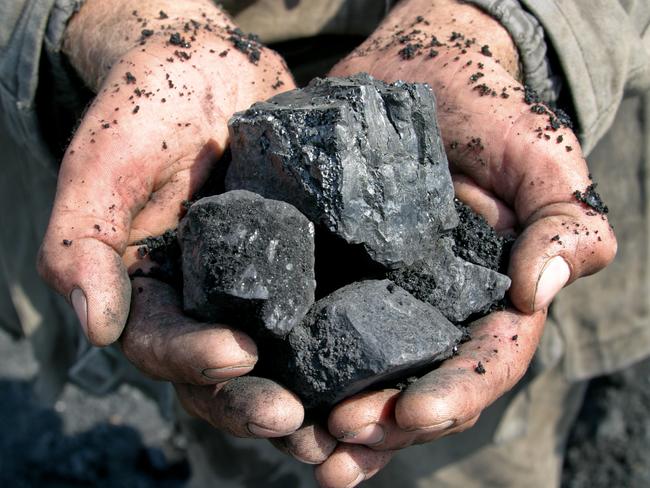
But the main trigger for the upgrade was the recent share price pullback below $24.00.
“We believe the self-help administered by BHP in the wake of weak commodity prices is finally paying dividends,” say Citi analysts led by Clarke Wilkins.
“Lower capex and payout based dividend policy underpin strong cash flow generation with free cash flow yield of 8-7 per cent for FY18/19 respectively (12 and 10 per cent respectively at spot commodity prices).”
“We expect the gearing to be 18 per cent by the end of FY17 giving BHP further room to return excess cash to shareholders.”
It says BHP could return about US$4.2b of cash to shareholders in FY18 and U$2.4 billion in FY19, increasing to about US$7b and $US4b for those years at spot prices.
This comes after Goldman Sachs cut BHP’s UK-listed shares to Sell amid commodity price falls.
BHP last $24.08. ADR’s equivalent close was $24.12.
John Durie 8.58am: A shortsighted gas intervention
The short-term problem with gas on the east coast is not so much supply as the price and Malcolm Turnbull’s extraordinarily heavy-handed market intervention should at least ensure the local producers are playing by the rules.
As long as the government doesn’t interfere in the pricing process and gas is available to local users at export parity prices, there is an arguable case for the Prime Minister’s dramatic policy, even if others may have urged more caution to let the threats do the job rather than taking out the sledge hammer. To interfere on domestic pricing and exports would be plain dumb.
Paul Garvey 8.55am: Santos in gas curb firing line
Santos (STO) and its partners in the $US18.5 billion ($24.7bn) Gladstone liquefied natural gas project are shaping as the biggest casualties of radical new gas export restrictions to be unveiled by Prime Minister Malcolm Turnbull today.
The Prime Minister is poised to announce new measures aimed at prioritising domestic gas supplies over exports in an attempt to increase local supply and bring down prices.
8.48am: Broker rating changes
BHP Billiton (BHP) raised to Buy vs. Neutral; $28.50 target price kept — Citi
Coca-Cola Amatil (CCA) raised to Outperform vs. Neutral — Credit Suisse
Beadell Resources (BDR) raised to Outperform vs. Neutral — Macquarie
Reliance Worldwide (RWC) initiated with Buy rating, $3.45 target price — Bell Potter
A2 Milk (A2M) cut to Hold vs. Buy — Bell Potter
Sarah Martin 8.37am: PM orders gas giants, Santos in firing line
Malcolm Turnbull will impose tough new restrictions on the country’s gas producers, introducing sweeping powers to block exports unless there are adequate supplies to meet the needs of Australian businesses and consumers.
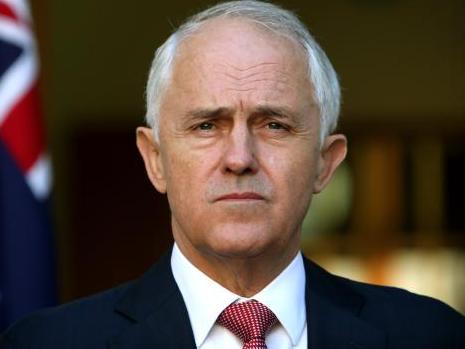
Declaring that the domestic shortage had led to consumers paying much more for gas than overseas buyers, the Prime Minister said on Wednesday the Australia-first policy was needed to ensure prices were lower and “fairly reflect international export prices”.
“Australians are entitled to have access to the gas they need at prices they can afford,” Mr Turnbull said ahead of an announcement expected in Brisbane on Thursday.
...
Origin and Shell produce more for the domestic market than they export. However, Santos (STO) was forced to take Mr Turnbull’s request on notice given its GLNG project in Queensland is a joint venture operated with three foreign companies — read more from Sarah Martin here
Read Paul Garvey: ‘Santos in gas curb firing line’
Read John Durie: ‘A shortsighted gas intervention’
7.20am: Flat start tipped for stocks
The Australian market looks set to open virtually unchanged, following Wall Street’s uninspiring lead.
At 7am (AEST), the share price futures index was down one point at 5,897.
In the US, the Dow Jones Industrial Average fell 0.10 per cent, while the S&P500 lost 0.05 per cent and the Nasdaq was steady.
Locally, in major economic news on Thursday, Reserve Bank of Australia governor Philip Lowe speaks at the Renminbi Global Cities Dialogue dinner in Sydney where global Renminbi (RMB) trading hubs experts will discuss key issues in the internationalisation of the Chinese currency.
The Australian Bureau of Statistics releases the International trade price indexes for the March quarter.
In equities news, Ten Network is expected to post its half-year results, Coles owner Wesfarmers is slated to release third quarter sales figures and Newcrest Mining is earmarked to release its quarterly production report. The Australian market on Wednesday closed higher for a fourth straight session, while the Australian dollar has fallen due to weaker-than-expected inflation numbers.
The benchmark S&P/ASX200 index rose 40.2 points, or 0.68 per cent, to 5,912 points.
The broader All Ordinaries index gained 36.1 points, or 0.61 per cent, to 5,936.8 points.
AAP
6.51am: Local dollar dips against US dollar
The Australian dollar is lower against its US counterpart as investors shy away from global commodity currencies, spooked by suggestions the United States may withdraw from the North American Free Trade Agreement (NAFTA). At 7.27am (AEST), the Australian dollar was worth US74.72 cents, down from US74.95c on Wednesday.
Westpac’s Imre Speizer said commodity currencies — such as the Aussie dollar — were rattled by reports the US may withdraw from NAFTA.
“(The) AUD initially extended losses to US74.55c — a four-month low — before bouncing to US74.83c in NY,” he said in a note on Thursday morning. The local currency subsequently has dropped again, and is also down against the yen and the euro.
Meanwhile “the US dollar index initially gained 0.6 per cent but shed around half of that following the US tax reform announcement”, Mr Speizer said.
AAP
6.40am: Trump flags cuts in corporate and individual taxes
President Donald Trump called for deep reductions in business tax rates and major changes to the individual tax system in a bid to reinvigorate his economic and legislative agenda as he nears the 100-day mark of his presidency. The plan largely hews to tax-cut proposals Mr Trump made during his presidential campaign last year, but it includes several crucial changes. Most notably, the GOP president is proposing to repeal a provision of the tax code that allows individuals to deduct the state and local taxes they pay from their reportable income.
Dow Jones — read more
6.34am: Wall Street steady on Trump’s tax plan
The Dow Jones Industrial Average slipped 21 points, or 0.1 per cent, to 20,975, after the Trump administration outlined its tax plan Wednesday. Expectations for lower taxes have helped US stocks climb since November. Some investors and analysts said the plan, which calls for reductions in business taxes rates and major changes to the individual tax system, was in line with what they were expecting. The S&P 500 dropped less than 0.1 per cent and the Nasdaq Composite edged down slightly. Shares of Twitter jumped 7.9 per cent after the company reported its first quarterly decline in revenue since going public, but still beat market expectations.
Dow Jones


